Edexcel iGCSE Biology-2.25 functions of carbohydrate, protein, lipid- Study Notes- New Syllabus
Edexcel iGCSE Biology-2.25 functions of carbohydrate, protein, lipid- Study Notes- New syllabus
Edexcel iGCSE Biology-2.25 functions of carbohydrate, protein, lipid- Study Notes -Edexcel iGCSE Biology – per latest Syllabus.
Key Concepts:
2.25 identify the sources and describe the functions of carbohydrate, protein, lipid (fats and oils), vitamins A, C and D, the mineral ions calcium and iron, water and dietary fibre as components of the diet
Components of a Balanced Diet – Sources & Functions
📝 Introduction
A balanced diet includes all essential nutrients in correct proportions.
Each has a source (where we get it from) and a function (what it does in the body).
🔑 Nutrients
1. Carbohydrates
- Sources: Rice, bread, pasta, potatoes, cereals, sugar.
- Functions:
- Main source of energy (broken into glucose).
- Stored as glycogen in liver & muscles.
2. Proteins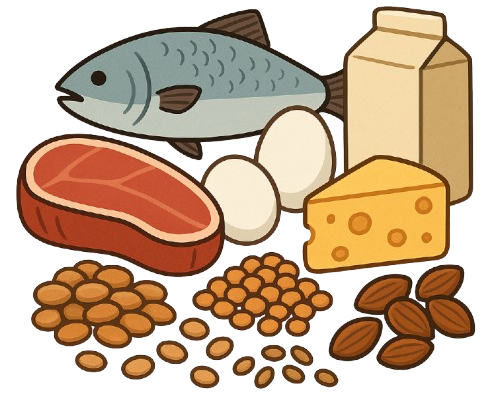
- Sources: Meat, fish, eggs, beans, pulses, dairy.
- Functions:
- Growth and repair of cells/tissues.
- Make enzymes, hormones, antibodies.
- Can be used for energy if carbs/fats are lacking.
3. Lipids (Fats & Oils)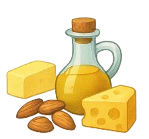
- Sources: Butter, cheese, oils, nuts, avocado.
- Functions:
- Long-term energy store (2x carbs).
- Insulation → maintains body temperature.
- Protects organs (shock absorber).
- Part of cell membranes.
4. Vitamin A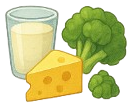
- Sources: Carrots, sweet potato, spinach, liver, dairy.
- Functions: Vision (esp. night), healthy skin, immunity.
5. Vitamin C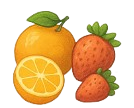
- Sources: Citrus fruits, strawberries, tomatoes, peppers.
- Functions: Collagen formation (skin, gums, connective tissue), wound healing.
- Deficiency: Scurvy.
6. Vitamin D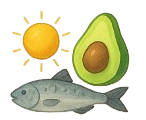
- Sources: Sunlight, oily fish, eggs, fortified milk.
- Functions: Absorbs calcium, strong bones & teeth.
- Deficiency: Rickets (soft/bent bones).
7. Calcium (Ca²⁺)
- Sources: Milk, cheese, yoghurt, leafy greens.
- Functions: Bones & teeth, blood clotting, muscle contraction.
8. Iron (Fe²⁺)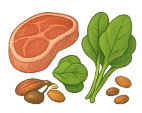
- Sources: Red meat, spinach, beans, liver.
- Functions: Haemoglobin → carries oxygen.
- Deficiency: Anaemia (tiredness, weakness).
9. Water 
- Sources: Drinks, fruits, vegetables, metabolic reactions.
- Functions: ~70% of body, chemical reactions, transport (blood/lymph), regulates temp.
10. Dietary Fibre
- Sources: Whole grains, vegetables, fruits, beans.
- Functions: Adds bulk, gut movement, prevents constipation, reduces bowel disease risk.
📊 Summary Table
| Nutrient | Sources | Functions | Deficiency |
|---|---|---|---|
| Carbohydrates | Rice, bread, pasta | Energy | Fatigue |
| Proteins | Meat, fish, beans | Growth, repair, enzymes | Kwashiorkor |
| Lipids | Oils, butter, nuts | Energy store, insulation | Poor insulation |
| Vitamin A | Carrots, spinach | Vision, skin | Night blindness |
| Vitamin C | Citrus fruits | Collagen, healing | Scurvy |
| Vitamin D | Sunlight, fish | Absorb calcium, bones | Rickets |
| Calcium | Milk, cheese | Bones, teeth, clotting | Weak bones |
| Iron | Red meat, spinach | Haemoglobin, O₂ transport | Anaemia |
| Water | Drinks, fruits | Reactions, transport, temp control | Dehydration |
| Fibre | Whole grains, veg | Gut movement | Constipation |
⚡ Quick Recap
Carbs → energy.
Protein → growth/repair.
Lipids → energy + insulation.
Vit A → vision.
Vit C → collagen + wound healing.
Vit D → absorbs calcium → strong bones.
Calcium → bones + clotting.
Iron → haemoglobin → O₂ transport.
Water → medium for life.
Fibre → gut health.
